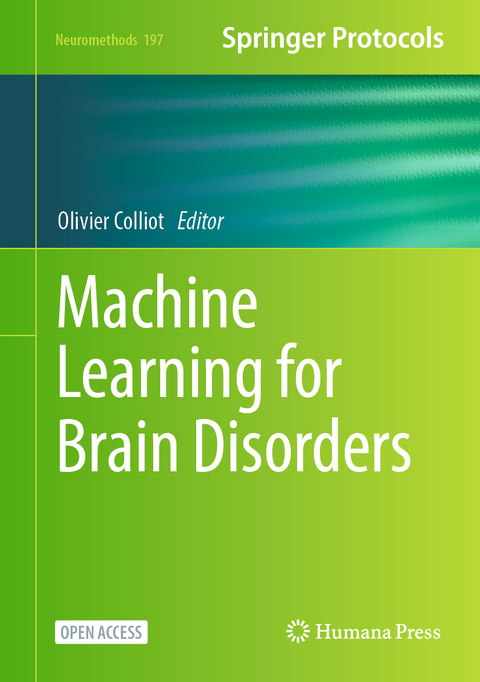
Machine Learning for Brain Disorders
Springer-Verlag New York Inc.
978-1-0716-3194-2 (ISBN)
This Open Access volume provides readers with an up-to-date and comprehensive guide to both methodological and applicative aspects of machine learning (ML) for brain disorders. The chapters in this book are organized into five parts. Part One presents the fundamentals of ML. Part Two looks at the main types of data used to characterize brain disorders, including clinical assessments, neuroimaging, electro- and magnetoencephalography, genetics and omics data, electronic health records, mobile devices, connected objects and sensors. Part Three covers the core methodologies of ML in brain disorders and the latest techniques used to study them. Part Four is dedicated to validation and datasets, and Part Five discusses applications of ML to various neurological and psychiatric disorders. In the Neuromethods series style, chapters include the kind of detail and key advice from the specialists needed to get successful results in your laboratory.
Comprehensive and cutting, Machine Learning for Brain Disorders is a valuable resource for researchers and graduate students who are new to this field, as well as experienced researchers who would like to further expand their knowledge in this area. This book will be useful to students and researchers from various backgrounds such as engineers, computer scientists, neurologists, psychiatrists, radiologists, and neuroscientists.
A Non-Technical Introduction to Machine Learning.- Classic Machine Learning Methods.- Deep Learning: Basics and Convolutional Neural Networks (CNN).- Recurrent Neural Networks (RNN) - Architectures, Training Tricks, and Introduction to Influential Research.- Generative Adversarial Networks and Other Generative Models.- Transformers and Visual Transformers.- Clinical Assessment of Brain Disorders.- Neuroimaging in Machine Learning for Brain Disorders.- Electroencephalography and Magnetoencephalography.- Working with Omics Data, An Interdisciplinary Challenge at the Crossroads of Biology and Computer Science.- Electronic Health Records as Source of Research Data.- Mobile Devices, Connected Objects, and Sensors.- Medical Image Segmentation using Deep Learning.- Image Registration: Fundamentals and Recent Advances Based on Deep Learning.- Computer-Aided Diagnosis and Prediction in Brain Disorders.- Subtyping Brain Diseases from Imaging Data.- Data-Driven Disease Progression Modelling.- Computational Pathology for Brain Disorders.- Integration of Multimodal Data.- Evaluating Machine Learning Models and their Diagnostic Value.- Reproducibility in Machine Learning for Medical Imaging.- Interpretability of Machine Learning Methods Applied to Neuroimaging.- A Regulatory Science Perspective on Performance Assessment of Machine Learning Algorithms in Imaging.- Main Existing Datasets for Open Brain Research on Humans.- Machine Learning for Alzheimer’s Disease and Related Dementias.- Machine Learning for Parkinson’s Disease and Related Disorders.- Machine Learning in Neuroimaging of Epilepsy.- Machine Learning in Multiple Sclerosis.- Machine Learning for Cerebrovascular Disorders.- The Role of Artificial Intelligence in Neuro-Oncology Imaging.- Machine Learning for Neurodevelopmental Disorders.- Machine Learning and BrainImaging for Psychiatric Disorders: New Perspectives.
| Erscheinungsdatum | 29.07.2023 |
|---|---|
| Reihe/Serie | Neuromethods |
| Zusatzinfo | 232 Illustrations, color; 33 Illustrations, black and white; XXXI, 1047 p. 265 illus., 232 illus. in color. |
| Verlagsort | New York, NY |
| Sprache | englisch |
| Maße | 178 x 254 mm |
| Themenwelt | Informatik ► Theorie / Studium ► Künstliche Intelligenz / Robotik |
| Medizin / Pharmazie ► Medizinische Fachgebiete ► Neurologie | |
| Medizin / Pharmazie ► Studium | |
| Naturwissenschaften ► Biologie ► Humanbiologie | |
| Naturwissenschaften ► Biologie ► Zoologie | |
| ISBN-10 | 1-0716-3194-2 / 1071631942 |
| ISBN-13 | 978-1-0716-3194-2 / 9781071631942 |
| Zustand | Neuware |
| Informationen gemäß Produktsicherheitsverordnung (GPSR) | |
| Haben Sie eine Frage zum Produkt? |
aus dem Bereich


